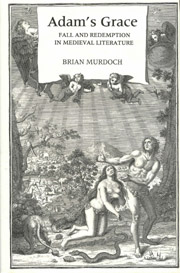Book contents
- Frontmatter
- Contents
- Ursula
- Preface
- Dedication
- Introduction: Interpreting Adam
- One After Eden: the Apocryphal Adam
- Two Written in Tablets of Stone: Adam and Gregorius
- Three Stultus et Insipiens: Adam, Parzival and the Knowledge of God
- Four Innocent Blood: Redemption and the Leper
- Five Promises to Adam: the Fall, the Redemption and Medieval Drama
- Six By the Scriptures Alone? Playing Adam in the Reformation and Beyond
- Bibliography
- Biblical Index
- General Index
Three - Stultus et Insipiens: Adam, Parzival and the Knowledge of God
Published online by Cambridge University Press: 12 September 2012
- Frontmatter
- Contents
- Ursula
- Preface
- Dedication
- Introduction: Interpreting Adam
- One After Eden: the Apocryphal Adam
- Two Written in Tablets of Stone: Adam and Gregorius
- Three Stultus et Insipiens: Adam, Parzival and the Knowledge of God
- Four Innocent Blood: Redemption and the Leper
- Five Promises to Adam: the Fall, the Redemption and Medieval Drama
- Six By the Scriptures Alone? Playing Adam in the Reformation and Beyond
- Bibliography
- Biblical Index
- General Index
Summary
THAT MEDIEVAL BIBLICAL COMMENTARY was a weighty matter might be tested fairly literally, provided one could one find a suitably accommodating librarian, by the simple process of weighing first a Bible, and then the collected volumes of Migne's Patrologia – the Latina alone should suffice to make the point. One might wonder, equally, whether literary works on the Fall and the Redemption do not also simply add to the weight on the wrong side of the scales. However, unlike specifically theological texts, a literary work will, in conforming to the principle of prodesse and delectare, typically use the latter to lead the audience to the former; certainly it may incorporate interpretations of the Bible or more complex theological arguments, but it will equally certainly simplify them, and may indeed resolve controversies, sometimes quite major ones, in a pragmatic manner; and it will, perhaps most importantly, address the way in which basic theological ideas affect the individual, since it is of individuals that audiences are made up. The use of literature to provide a moral exemplar is an old established practice which is still (fortunately) recommended on a regular enough basis; the other senses of scripture – to keep to medieval terms – come into play as well, however.
In the first essentially literary expansion of the biblical Genesis, the apocryphal Adambooks place the same characters into the human world of time and death after their fall from Paradise and observe their reactions and their more immediate confrontations with the devil.
- Type
- Chapter
- Information
- Adam's GraceFall and Redemption in Medieval Literature, pp. 76 - 101Publisher: Boydell & BrewerPrint publication year: 2000



